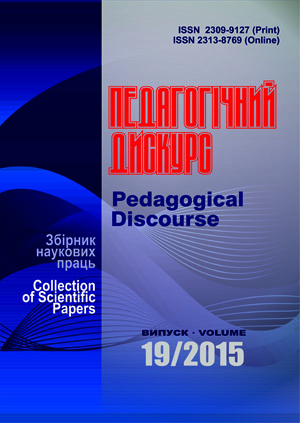Stefan Baley About the Role of Out-Educational Social Relations in the Personality Education
Abstract
Stefan Baleyʼs scientific views on the problem of indirect educational influence on the personality are analyzed in the article.
On the basis of scientific works pedagogical reconstruction, in particular «The Essay on Educational Psychology» «Psychology of Educational Contact» and «Personality», it is shown that Ukrainian and Polish scientist considers educational relations in the context of other social relations, which are: the relations of struggle, the relations of power, the relations of tolerance, management and protection, the relations of favorable attitude. It is proved that out-educational social relations cause the specific mutual reaction of a child and an adult. Such specific reaction is called by Stefan Baley the phenomenon of «educational contact». This educational contact, due to scientistʼs opinion, is the exit point of any action which could lead to constant transformation of the individual. Therefore, the out-educational social relations provide constant development of the personality. Moreover, they can be used by intentional education to achieve educational aims.
In particular, the relations of favorable attitude have the opportunities of indirect educational impact. When we are talking about educatorʼs favorable attitude to a pupil, these relations often act as an incentive. This incentive encourages the educator to use the systematic educational activities, which are the most useful for pupils. Meanwhile, love and admiration to adult is the exit point of childʼs conscious efforts aimed at his/her self-education. The role of the relations of struggle in education differs from the relations of favorable attitude. The relations of struggle have a dissimilative tendency. The child more or less consciously chooses the ideals that differ from those, which are embodied in unpleasant person. The understanding of a child is the basis of respect and tolerant attitude to him/her. The adult, who understands the child, has more chances to explain him/her clearly the essence of a problem and to form the correct notion. Therefore, due to understanding, the typical human tendency of sharing knowledge is gaining much educational value. Defining educational opportunities of the relations of management, it is necessary to distinguish two aspects. Both of them promote self-education of a pupil. These are authority and favorable attitude. Only friendly attitude itself, without recognitions of adultʼs preferences, does not have such power as the authority.
Finally, the specificity of education as a certain conscious process is not only the direct application of special educational activities, but also is the skillful management of out-educational social relations.
Downloads
References
Baley S. Psychologja kontaktu wychowawczego: [scrypty z wykladow wygloszonych w trzym. jesiennym i zimowym roku akadem. 1930/1931] (Psychology of Educational Contac [the script of the lectures given in autumn and winter trimesters of 1930/1931 akadem. year]), Warszawa: Kolo Pedagogiczne Studentow Uniwersytetu Warszawskiego, 1931. – 72 p. [in Polish]
Baley S. Psychologja wieku dojrzewania (Psychology of the Pubertal Age), Lwiw; Warszawa: Ksiaznica-Atlas, 1932. – 262 p. [in Polish]
Baley S. Psychologia wychowawcza w zarysie (The Essay on Educational Psychology), Warszawa : PWN, 1958. – 415 p. [in Polish]

















